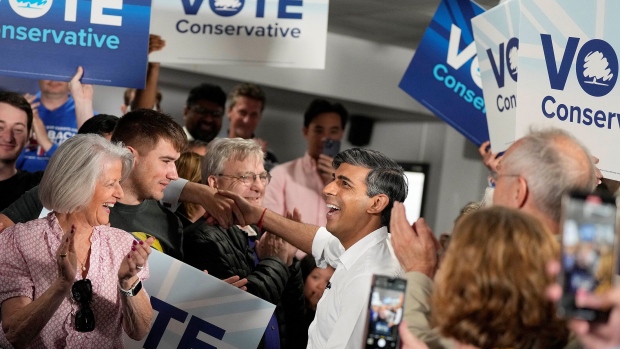May 27, 2024
Sunak Offers Pensioners Tax Cut as Tory Poll Shows Reform Threat
, Bloomberg News

(Bloomberg) -- Prime Minister Rishi Sunak promised pensioners a tax cut if his Conservatives upset the odds and win the general election, the latest gambit to try to shore up the core vote as internal polling showed the Tories could lose more than 100 seats due to the resurgence of the right-wing Reform UK party.
Sunak said the tax-free personal allowance for pensioners will rise in line with the so-called triple lock, the guarantee that the state pension rises by the highest of earnings, wages or 2.5%. The change is worth an initial £100 ($128) a year for about 8 million pensioners, the Tory campaign said.
Labour’s shadow chancellor Rachel Reeves, meanwhile, will use her first speech of the campaign on Tuesday to promise to “bring growth back to Britain” with a government that is both pro-worker and pro-business, according to her office.
Labour published a letter in the Times newspaper endorsing the party signed by more than 100 business leaders, including former JP Morgan Cazenove vice chairman Charles Harman, John Holland-Kaye, the former boss of Heathrow, and the former chief executive of Tesco Bank Benny Higgins.
“In the face of Tory chaos, stability is change,” Reeves will say. “The Conservatives’ have failed the economy. The plan isn’t working. And Rishi Sunak’s decision to call an early election is the clearest sign of that. If he doesn’t believe his plan is working, why should you?”
Sunak’s tax giveaway comes after an internal document produced by senior party officials this weekend, seen by Bloomberg, warned that more than 100 Tory members of Parliament risk losing their seats if voters who previously backed the Conservatives either back Reform UK or don’t vote on July 4.
The anti-immigration party founded by Brexit campaigner Nigel Farage is not expected to win seats itself from the Conservatives, but rather open the door for Labour gains by splitting the right-wing vote, the analysis found. Support for both the Tories and Reform tends to skew older.
It’s the first time Sunak’s aides have put a number on the threat posed by Reform, which was borne out of previous Farage parties and has increased its support over the past year. With the Labour Party ahead by about 20 points in national polls, Sunak already faces an uphill task to keep his job.
A setback in Telford, central England, illustrated the point on Monday, when outgoing Conservative MP Lucy Allan said she planned to support Reform’s candidate in the seat. The Tories responded by kicking her out of the party.
The internal warnings in part explain Sunak’s campaign strategy since he called the vote last week. Focusing on Reform UK, the prime minister put an initial focus on his controversial policy to deport asylum seekers to Rwanda. The aim was to win back votes from the right-wing party, close the gap to Labour and build momentum for a final push to polling day, Bloomberg reported last week.
Then on Saturday, Sunak announced he would bring back National Service for 18-year-olds. Speaking in Buckinghamshire on Monday, he said the policy would boost security and make British society “more cohesive” — buzzwords that wouldn’t be out of place at a Reform UK rally or on Farage’s GB News show.
Polls show that what support that does exist for reintroducing national service is concentrated among older voters, suggesting that Labour leader Keir Starmer mocking the idea as a “teenage Dad’s Army” — a reference to a famous sitcom set around hapless volunteers in World War II — won’t worry Sunak too much.
Read more: Starmer and Sunak Trade Jibes as Rivals Zone In on Target Voters
But the strategy carries risks. Conservative MPs including Steve Baker hit out at a plan that appears to have been sprung on the party. It’s also highly unlikely to help with Sunak’s other major problem: the squeeze he faces on the left of his party from the centrist Liberal Democrats, who are targeting traditional Tory heartlands including in Buckinghamshire, where Sunak was on Monday.
There’s another danger for Sunak, that what the prime minister describes as a series of “bold” plans instead come across with voters as a desperate roll of the dice by a party trailing so far behind in the polls. It’s a political dynamic that hurt Starmer’s predecessor Jeremy Corbyn in 2019, when he led Labour to an historic defeat despite having some policies that polled well individually.
Meanwhile, Sunak’s proposed tax cut for pensioners, which the Tories called a “Triple Lock Plus,” triggered an immediate row with Labour on spending.
The Conservatives said the plan will cost £2.4 billion a year by the end of the decade and could be funded by a previously announced clampdown on tax avoidance, according to an emailed statement.
But Labour accused the Conservatives of spending money the government doesn’t have — a charge the Tories usually like to level at the opposition party — while pointing out that the tax burden has soared under Sunak’s government.
“This is just another desperate move from a chaotic Tory party torching any remaining facade of its claims to economic credibility,” Jonathan Ashworth, Labour’s shadow paymaster general, said in a statement. He also said the Tories’ ambition to abolish national insurance — which they haven’t put a time frame on — threatens the “very basis of the state pension.”
--With assistance from Asad Zulfiqar.
(Updates with businesses endorse Labour in fourth paragraph.)
©2024 Bloomberg L.P.








